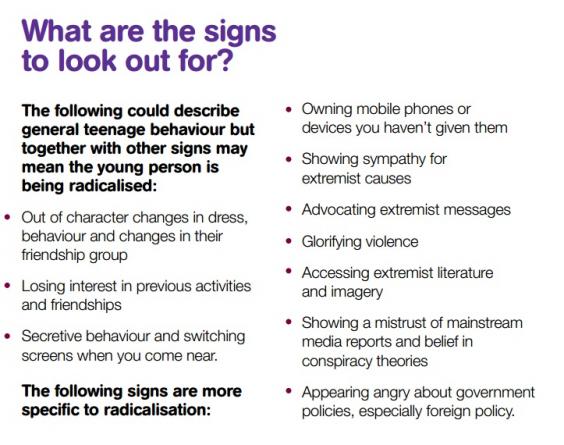The Independent | 2 Dec 2015
Young people who question Government or media may be extremists, officials tell parents
Signs to look out for include showing mistrust in mainstream media reports and belief in conspiracy theories
Child protection officials been criticised after warning parents that young people who take issue with government policy or question what they are told in the media may have been radicalised by extremists.
A leaflet drawn up by an inner-city child safeguarding board warns that “appearing angry about government policies, especially foreign policies” is a sign “specific to radicalisation”.
Parents and carers have also been advised by the safeguarding children board in the London Borough of Camden that “showing a mistrust of mainstream media reports and a belief in conspiracy theories” could be a sign that children are being groomed by extremists.
Other apparent hints listed include young people changing friendship groups or styles of dress, secretive behaviour, switching computer screens when adults approach, or glorifying violence.
The leaflet says children who show a combination of these signs may be en route to emulating those who “have been persuaded to leave the country in secret and against the wishes of their family, putting themselves in extreme danger as a result”.
“This leaflet aims to help parents and carers recognise when their child may be at risk from radicalisation and where to get help if they are worried,” it explains.
Camden Safeguarding Children Board is a statutory organisation overseen by the area’s local council to safeguard children in the borough.
Council officials and local politicians sit in the board, as well as local voluntary groups and community organisations. Local Safeguarding Children Boards are mandated by the Government all around the country under the Children Act 2004.
Bella Sankey, policy director at the campaign group Liberty, criticised the leaflet.
“Children should be encouraged to take an interest in politics and think critically about what they see in the media, not deemed suspect for so doing,” she said.
“Clumsy laws and policies that encourage suspicion in family homes will alienate ordinary teenagers and may further marginalise those genuinely at risk. If we want to keep our children away from violent extremism, we must include them in open discussion and teach human rights values, not police democratic concerns about government policy.”
This summer academics and writers warned in a letter published in the Independent that the Government’s counter-terrorism strategy, spearheaded by the Prevent programme, would have a chilling effect on open debate, free speech, and political dissent.
The letter’s signatories warned that groups affected by the crackdown could include non-violent groups such as anti-austerity and environmental campaigners – “largely those engaged in political dissent”.
“Prevent [the strategy] will have a chilling effect on open debate, free speech and political dissent,” the signatories warned.



